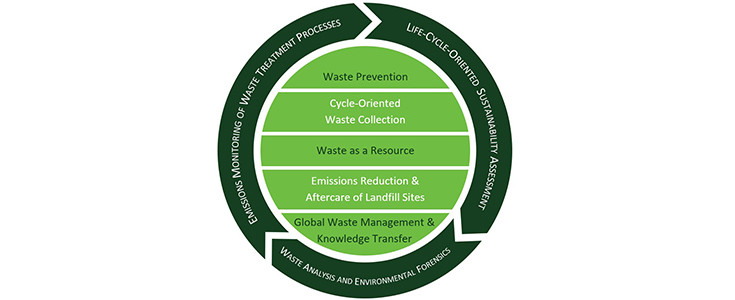Research
Research
According to the three-pillar principle of BOKU (combination of technology, natural sciences and economic, social and legal sciences) we develop innovative concepts, methods and procedures
- for planning and evaluation of waste prevention measures,
- to close natural and anthropogenic material cycles,
- for low-emission waste treatment and
- for the aftercare and monitoring of landfills and old deposits.
The global interdependence of the economy and material flows requires waste flows to be analysed in a comprehensive context and cross-national solutions to be found.
Our current research areas are:

Latest SCI publications
Latest Projects
Research project (§ 26 & § 27)
Duration
: 2024-12-10 - 2025-08-09
In 2023, the Institute for Wastemanagement and Circularity at the BOKU-University, in collaboration with Tafel Österreich, developed a traveling exhibition to prevent food waste. In its first year, it reached more than 5,000 students. The traveling exhibition has already shown great success in an initial evaluation and has been proven to expand the knowledge of visitors and spark interest in the topic among students between the ages of 11 and 17.
An evaluation of the teaching units (worksheets and workshops) shows that the students' own parents are the most important point of contact for them, but it is not known how they can be reached most effectively in terms of reach and knowledge transfer.
The following research questions will therefore be addressed in the project.
How many parents are informed by their children about the exhibition and what information do they receive?
Can the reach of knowledge transfer be increased by providing targeted information to parents in advance?
How can a change in behavior in households be promoted and improved in the future after awareness-raising teaching has been implemented? Are there ways to actively involve the children's families?
Research project (§ 26 & § 27)
Duration
: 2024-12-01 - 2025-11-30
The previous practice of open windrow composting of digestate from the biogas plant in Lana, South Tyrol, faced significant challenges, including odor nuisances that led to complaints from local residents. Due to these issues, on-site composting was discontinued, and the digestate was instead transported to other regions or exported.
The aim of this project is to develop a sustainable and environmentally friendly solution for utilizing digestate that avoids the problems of the past. Optimized, low-emission on-site composting offers an opportunity to strengthen the regional circular economy, protect the environment, and reduce costs (e.g., by avoiding long transport distances).
In light of the proposed Renewable Gas Act and the associated promotion of biogas production, efficient utilization of digestate is expected to become increasingly important in Austria as well.
The project aims to develop an optimized process for windrow composting of digestate and residues from the food industry that minimizes odor and greenhouse gas emissions while enabling efficient utilization of this valuable resource. By combining targeted process control with comprehensive monitoring, the project seeks to create a sustainable and environmentally friendly solution for the on-site use of digestate.
Research project (§ 26 & § 27)
Duration
: 2024-10-01 - 2025-06-30
The core objective of the project is the nationwide survey of the volume and composition of littered waste collected via public waste bins on the basis of the analysis guideline for waste disposed of in public collection systems and littered waste within the meaning of Art. 8 Single-Use Plastics Directive, Directive 2019/904/EU, which enables efficient, transparent and comparable surveys based on the ratio of analysis effort and achievable accuracy and clearly describes the entire investigation process incl. definition of the investigation objective, division of the population, planning and implementation of analyses including sorting and documentation. It also provides a concise and clear description of the entire survey process (including definition of the survey objective, subdivision of the population, planning and implementation of analyses, including sorting and documentation).
